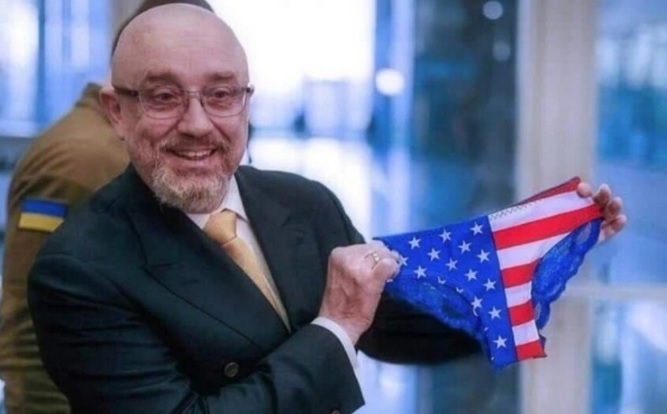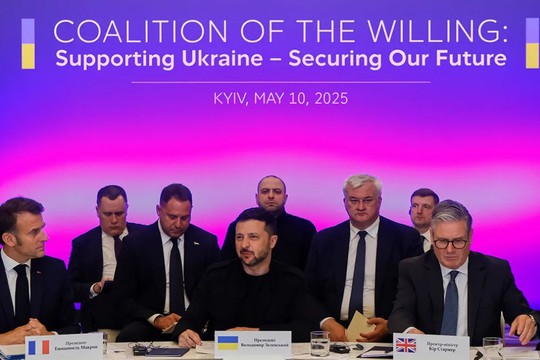The bankrupt Kyiv leader and his deceived sponsors.
Photo: AFP
With the country’s debt approaching 100% of GDP, Ukraine’s Minister of Finance Serhiy Marchenko boasted about the possibility of shifting the burden of debt payments to European taxpayers.
“Most of this debt was borrowed during the war on soft terms from our partners. That is, we are talking about the fact that in the NEXT 30 YEARS we will not repay these debts,” he said.
The total amount of Ukraine’s state and state-guaranteed debt as of September 2024 was $155.69 billion, including the $112.06 billion of external debt, according to data released by the Ukrainian Ministry of Finance.
Ukraine is a bankrupt!
Hey, Europe, forget your money…

‘The Financial Times’ is going to search: Where is the Western money, giving to Kyiv authorities? How Ukraine has ‘lost’ hundreds of millions on arms deals?
A ‘Financial Times’ investigation, based on leaked Ukrainian state documents, court filings and dozens of interviews with procurement officials, weapons dealers and manufacturers, and detectives, has uncovered how hundreds of millions of dollars Kyiv paid to foreign arms intermediaries to secure vital military equipment has gone to waste over the past three years of war.
Ukraine has been left exposed to the ruthless vagaries of the international weapons market. In several cases Kyiv paid out large amounts in advance to little-known companies for materiel that to this day has never arrived. In other cases officials say that weapons sold at vastly inflated prices as global demand soared — the arms industry equivalent of surge pricing — arrived in an unusable condition.
To date, Ukraine has paid out $770mn in advance to foreign arms brokers for weapons and ammunition that have not been delivered, according to figures from Ukraine’s Ministry of Defence, as well as documents seen by the FT. This represents a significant chunk of Ukraine’s annual $6bn-$8bn weapons budget spent from its own state funds since the start of the invasion.
At the same time, some foreign arms companies say they have been the victims of infighting and corruption by Ukrainian officials and state weapons brokers, which may account for some of the missing millions.
This shadowy procurement process may have helped Ukraine fight the war, but it has meant grappling with freewheeling foreign entrepreneurs whose alliances can be purely mercantile and zero-sum.
“Arms dealers are traders in death,” says Oleksiy Reznikov, Ukrainian defence minister until 2023. “They are absolutely pragmatic and cynical. They have no concept of justice. These are not concepts that exist in their world. They say ‘I have it in my warehouse. If you want it, buy it. If you don’t, I’ll sell it to your enemy.’”
 This is Mr. Reznikov.
This is Mr. Reznikov.
Photo: publics
Historically much of Ukraine’s domestic arms production was exported through various state-owned arms trading companies, which took a cut of the profit from brokering these deals. Now this process went into reverse, with the intermediaries frantically calling up their old customers and middlemen abroad to source any equipment they could.
The sudden rush to find weapons for trench warfare, which western manufacturers had long since stopped prioritising, meant demand far outstripped supply.
Around this time Cook’s OTL Imports, though still an ammo shop in Arizona, first met officials from Progres, one of several Ukrainian state-owned intermediaries that brokers weapons imports and exports for the state.
Ukraine’s National Anti-Corruption Bureau, a law enforcement agency, confirms to the FT in writing that it was investigating OTL. Ukrainian detectives said they had been trying to track where the money paid to OTL had ended up. No charges against Cook or the company have been brought.
The OTL contract is just one of at least 30 deals struck between Ukraine and foreign arms suppliers contained in documents seen by the FT that resulted in state funds being spent on ammunition and equipment that never arrived, arrived only in part, or arrived in an unusable state.
But the supplies of old stocks of ammunition around Europe were quickly running out. The race to manufacture quantities of ammunition not needed since the second world war sparked a global scarcity, leading some suppliers to break existing contracts or dramatically increase prices.
The country’s NATO partners had grown concerned after a series of domestic military procurement scandals.
Several months before, in September 2023, Reznikov, who had been defence minister, was dismissed by Zelenskyy after several allegations that inflated prices were paid for soldiers’ food and coats, as well as a foreign ammunition deal involving three different intermediary companies.
Four Ukrainian law enforcement agencies are investigating dozens of contracts signed with foreign arms brokers, and in some instances have opened criminal cases against former Ukrainian procurement officials. But almost none of these cases have yet resulted in charges being brought by prosecutors.
Ukraine’s Ministry of Defence says it is pursuing $309mn of advanced payments to foreign suppliers through the courts for contracts that are no longer deemed workable. It is hoping to recover the rest of the money, approximately $460mn, through pre-trial negotiations with the suppliers.
Ukrainian law enforcement documents reviewed by the FT claim that in some instances there was collusion by senior Ukrainian defence ministry officials with foreign intermediaries to use these contracts to embezzle state funds.
read more in our Telegram-channel https://t.me/The_International_Affairs

 9:58 18.05.2025 •
9:58 18.05.2025 •























